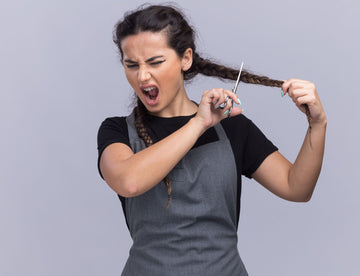
Introduction to the Role of Diet in Hair Fall Prevention
Have you ever noticed how our hair reflects our overall health? It's like a mirror that can reveal signs of wellness or underlying imbalances. Just like you, I've come to appreciate the profound impact of diet on hair health and preventing hair fall. It's fascinating how the nutrients we consume weave into the fabric of our hair's strength and vitality.
Our hair is made up of a protein called keratin, and this protein thrives on—you guessed it—protein! That's where a balanced diet steps in, providing the essential amino acids that form the foundation of strong and resilient hair strands. But it doesn't stop there; vitamins like A, C, and E, along with biotin, iron, zinc, and omega-3 fatty acids, join the spotlight. They're the supporting cast that nourishes the scalp, boosts blood circulation, and battles oxidative stress, all vital for healthy hair growth.
On the flip side, a diet loaded with sugar and processed foods could play the villain by triggering inflammation that might lead to hair loss. Hydration, too, is a backstage hero, keeping hair moisturized and less prone to breakage. So, when we pair a nutrient-rich diet with proper hair care and a holistic approach to well-being, we're on a promising journey to prevent hair fall and keep our locks thriving.
So, The health of your hair is closely linked to the nutrients you consume, as they provide the building blocks necessary for hair growth and maintenance.
Here are some key nutrients and dietary considerations that can help prevent hair loss:
Protein:
Hair is made up of a protein called keratin, so consuming enough protein in your diet is crucial for hair health. Protein provides the necessary amino acids that support hair growth and strength. Include lean meats like chicken and turkey, fish, eggs, and plant-based protein sources like lentils, beans, tofu, and quinoa in your meals.
Vitamins:
- Vitamin A: It helps in the production of sebum, an oily substance that moisturizes the scalp and prevents dryness. Incorporate foods rich in vitamin A, such as sweet potatoes, carrots, spinach, and kale, into your diet.
- Vitamin C: This vitamin is essential for the production of collagen, a protein that supports hair structure. Citrus fruits, strawberries, bell peppers, and broccoli are excellent sources.
- Vitamin E: It improves blood circulation to the scalp and helps maintain a healthy environment for hair growth. Nuts, seeds, and leafy greens are good sources of vitamin E.
- Vitamin D: This vitamin is linked to hair follicle health. Along with fortified dairy products, fatty fish like salmon and exposure to sunlight are sources of vitamin D.
Biotin:
Also known as vitamin H, biotin is important for healthy hair growth. Foods like eggs, nuts, seeds, and sweet potatoes contain biotin.
Iron:
Iron deficiency can lead to anemia, which can result in hair loss. Incorporate iron-rich foods like lean meats, poultry, beans, lentils, spinach, and fortified cereals into your diet to maintain healthy iron levels.
Omega-3 Fatty Acids:
Omega-3 fatty acids are anti-inflammatory and promote scalp health, which in turn supports healthy hair growth. Include fatty fish like salmon and mackerel and sources like flaxseeds, chia seeds, and walnuts in your diet.
Zinc:
This mineral supports hair follicle health and prevents hair loss. Foods like oysters, nuts, seeds, and whole grains provide zinc.
Collagen:
Collagen is a protein that contributes to hair structure and strength. Incorporate collagen-rich foods like bone broth or consider collagen supplements to support hair health.
Antioxidants:
Antioxidants help protect hair follicles from damage caused by free radicals. Fruits and vegetables, particularly those with vibrant colors (e.g., berries, tomatoes, and leafy greens), are excellent sources of antioxidants.
Hydration:
Staying hydrated is vital for maintaining healthy hair. Water keeps hair moisturized and prevents dryness and brittleness.
Limit Sugar and Processed Foods:
High-sugar diets and processed foods can lead to inflammation throughout the body, including the scalp. This inflammation can negatively impact hair health and contribute to hair loss.
Avoid Crash Diets:
Extremely low-calorie diets, or crash diets, can lead to nutrient deficiencies, including those that are important for hair growth. Maintain a balanced diet to ensure you're getting all the necessary nutrients.
Balance:
A balanced diet that includes a variety of nutrient-rich foods is essential. Each nutrient plays a role in hair health, and an overall well-rounded diet supports the best outcomes for your hair.
Conclusion to Role of diet in preventing hair fall:
In conclusion, the role of diet in preventing hair loss is a dynamic and pivotal one. Just as a carefully composed symphony requires a harmonious blend of instruments, our bodies and hair thrive on the symphony of nutrients we provide through our diet. From proteins that lay the foundation of strong strands to vitamins and minerals that orchestrate scalp health, blood circulation, and protection against damage, every nutrient plays a vital role.
By choosing a diet rich in these hair-loving components, and complementing it with holistic care and professional guidance where needed, we can nurture our hair's resilience and maintain a vibrant, healthy crown of confidence. Remember, a balanced diet isn't just about nourishing our bodies; it's also about embracing the journey to strong, beautiful hair that reflects our inner vitality.
- Antioxidants,
- avoid crash diet,
- avoid hair fall with balanced diet,
- Balanced Diet,
- best hair care products,
- best hair care routine,
- Biotin,
- Collagen,
- common myths of hairfall,
- diet for hair fall prevention,
- Hair Care,
- hair care oil,
- hair Care products,
- hair fall prevention,
- Hydration,
- Iron,
- Limit sugar and processed food,
- Omega-3 fatty acids,
- Proteins,
- rich nutrients for hair fall,
- Role of Diet in Hair Fall Prevention,
- vitamin A,
- Vitamin C,
- Vitamin D,
- Vitamin E,
- Zinc




